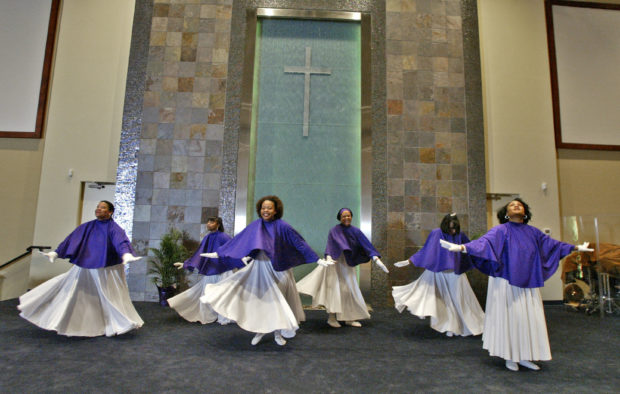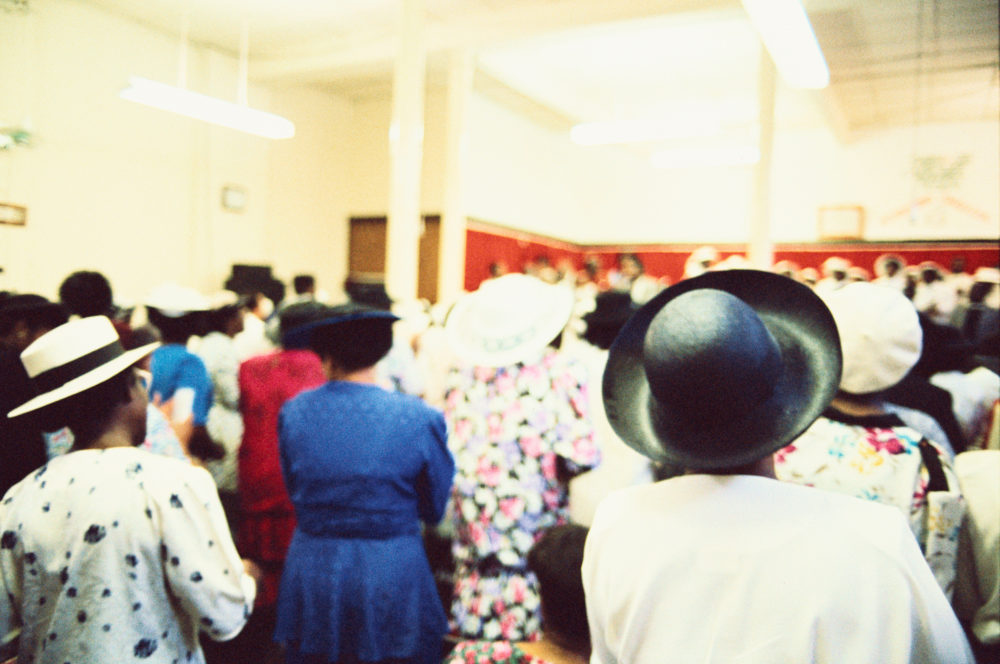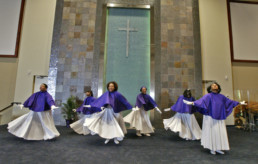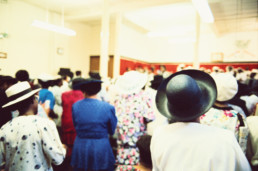Stalled Curtain Call
Stalled Curtain Call
Annick Laurent | acl2220@columbia.edu

Dressed from head to toe in red, six praise dancers performed a lyrical piece to the gospel song, “Praise is What I Do” by William Murphy. The performance was scheduled for a special women’s service at the Simpson United Methodist Church in Wilmington, Del., in mid-April. Instead, recordings from January and December 2019 screened on the videoconferencing platform Zoom.
The show must and did go on. Sort of. Christian dance ministries throughout the United States have been able to maintain some semblance of normalcy with virtual rehearsals and performances. Individual dancers and groups have found ways to simultaneously keep up with spiritual movement traditions, engage with their religious communities and adhere to social distancing.
The Delaware program was organized by a group called Melodic Movements Performing Arts Program, Inc.
Melodic Movements posted an excerpt to its Instagram account with “The Movement Continues” followed by a glittering pink heart emoji in the caption. The girls’ long crimson skirts fanned out in triangles that disappeared as almost as quickly as they took shape. Their high kicks and arabesques, as well as many twirls, falls and dips were mirrored on the shiny, orange-tinted wooden floor as their instructors and parents watched from the room’s back corners. The onlookers – some dressed in their Sunday’s best from their respective living rooms – offered warm appreciative smiles and words.
One of the group’s last praise dance performances before a live audience was for Scott AME Zion Church in late February. Wilmington natives and public officials -- including Republican Congresswoman Lisa Blunt Rochester, Democrat Representative Sherry Dorsey Walker, City Councilwoman Rysheema Dixon – and Robert Tracy, the Chief of Police, were all in attendance.
Then things changed.
Governor John Carney issued Delaware’s official shelter in place order on March 22, which went into effect at 8:00 a.m. two days later. All non-essential businesses are to remain closed until May 15 or “until the public health threat is eliminated.”
Almost all categories under “Leisure and Hospitality” were prohibited from operating. So, Melodic Movements and other performing arts companies, and independent artists, writers and performers had to shut down. It was the same case for religious organizations which are listed as “Other Services (except Public Administration).”
“God sends us through storms and valleys to strengthen our faith,” read a status posted to Melodic Movements’ Facebook page on March 15. “Despite the National Emergency, schools and business cancellation and spread of the Coronavirus, how many believe God is STILL a way maker, miracle worker, promise keeper and light in the darkness?”
Accompanying the status was a clip of the Beginner Praise Dance class ministering in the company’s studio.
The organization’s plans for the spring and summer such as its Arts Integration Camp, the annual Summer Program auditions, and the upcoming workshops had to be postponed or held remotely.
“Virtual Dance Classes are off to a great start,” a Facebook post from March 17 reads. “Never stop dancing.”
Since the governor’s order, teachers and students have been maintaining community through social media. And classes are still in session. Training in several genres including ballet, hip hop, acrobatics and majorette stylings have all been held online last and this month. The teachers have been providing instruction and encouragement, cheering them on from afar.
“During this time, let us reflect on the beautiful things that God has done for us. 1 Chronicles 16:12 tells us to, ‘Remember his marvelous works that he hath done, his wonders, and the judgements of his mouth.’ God is able to do anything but fail. Let us praise him in advance with expectancy in our hearts. ‘Because praise is what we do, even when we’re going through!’”
Silent Tears
Silent Tears
Annick Laurent | acl2220@columbia.edu

On a recent Sunday morning, the Sanctuary Choir at the Convent Avenue Baptist Church in Harlem sits relatively still, with the exception of those fanning themselves with the day’s programs. There are about 40 choir members, all dressed in bright blue robes with kente cloth embellishments sewn on the shoulders.
On the church floor, white-gloved ushers are guiding late comers across the wine-colored carpet to the few remaining spots in the roughly 1,000-seat church. Above the choir is an arch with the phrase “One Lord, One Faith, One Baptism,” painted on it in all caps.
Seconds later, Dr. Gregory Hopkins, the choir’s director, gives the singers the cue to rise to their feet. A familiar melody fiercely erupts from the organ. It is “Lift Every Voice and Sing” and it is sung by the choir with palpable pride to commemorate Black History Month and honor the souls of ancestors who fought for freedom.
The instrumental version of the first line plays once:
“Lift every voice and singgggg...”
Ed Broms, the organist, held on the note for “sing” in the opening line with a key on his left hand as his other one fluidly moves through the right side with ease. Light flute-like notes flutter in the air with quick succession, layered the deep “sing.”
Broms repeats the opening phrase a few more times, going higher on the scale with smooth transitions.
With the grace of a dancer, Hopkins raised his arms with pulsing wing-like motions to the beat of the spiritual. The choir followed his pace.
The first stanza is delivered in staccato fashion:
“Lift every voice and sing
Till earth and heaven ring
Ring with the harmonies of Liberty
Let our rejoicing rise
High as the list'ning skies, let it resound, loud as the rolling sea.”
The tenors and sopranos distinguish themselves in tone and delivery. The women repeat “lift every voice and sing” at the end of each line
“Sing a song full of faith that the dark past has taught us
Sing a song full of the hope that the present has brought us
Facing the rising sun of our new day begun
Let us march on, let us march on, ‘til victory is won”
Originally conceived in 1900 as a poem, “Lift Every Voice and Sing” was penned by James Weldon Johnson, who was a lawyer and high school principal before pursuing a writing career full-time. J. Rosamond Johnson added the music to the ballad five years later, giving its poignant lyrics a vivacious uplifting accompaniment. Their collaboration is often regarded by African Americans as the “Black National Anthem” in addition to being a hymn that calls on God for aid through strife and fatigue.
I am overwhelmed hearing it sung. The choir’s rendition takes me on a winding emotional rollercoaster. The preface is buoyant and encouraging in the first verse before it transforms into something reminiscent of a chant for steadily marching soldiers. It is a musical salute to the foreparents, acknowledgement of sacrifices along a rocky unrelenting treadmill of a path.
Greatly contrasting the thundering start, the next verse is a whisper by comparison.
We have come, we have come over a way
That with tears have been watered
We have come, we have come treading our path
Through the blood of the slaughtered,
Out from the gloomy past,
Where the white gleam of our bright star is cast.
“The slaughtered.” Unfallen tears put pressure on my eyes.
The notes become less divergent, almost meeting in the middle. The tune slows and takes a somber turn, embodying communal mourning.
God of our weary years,
God of our silent tears,
Thou who has by Thy might
Led us into the light,
Keep us forever in the path, we pray.
Lest our feet stray from the places,
Our God, where we met Thee,
Lest, our hearts drunk with the wine
Of the world, we forget Thee;
Shadowed beneath Thy hand,
May we forever stand.
True to our GOD,
True to our native land.”
The choir ended the song in a rich, dragging, reverberating “Amennnn.”


